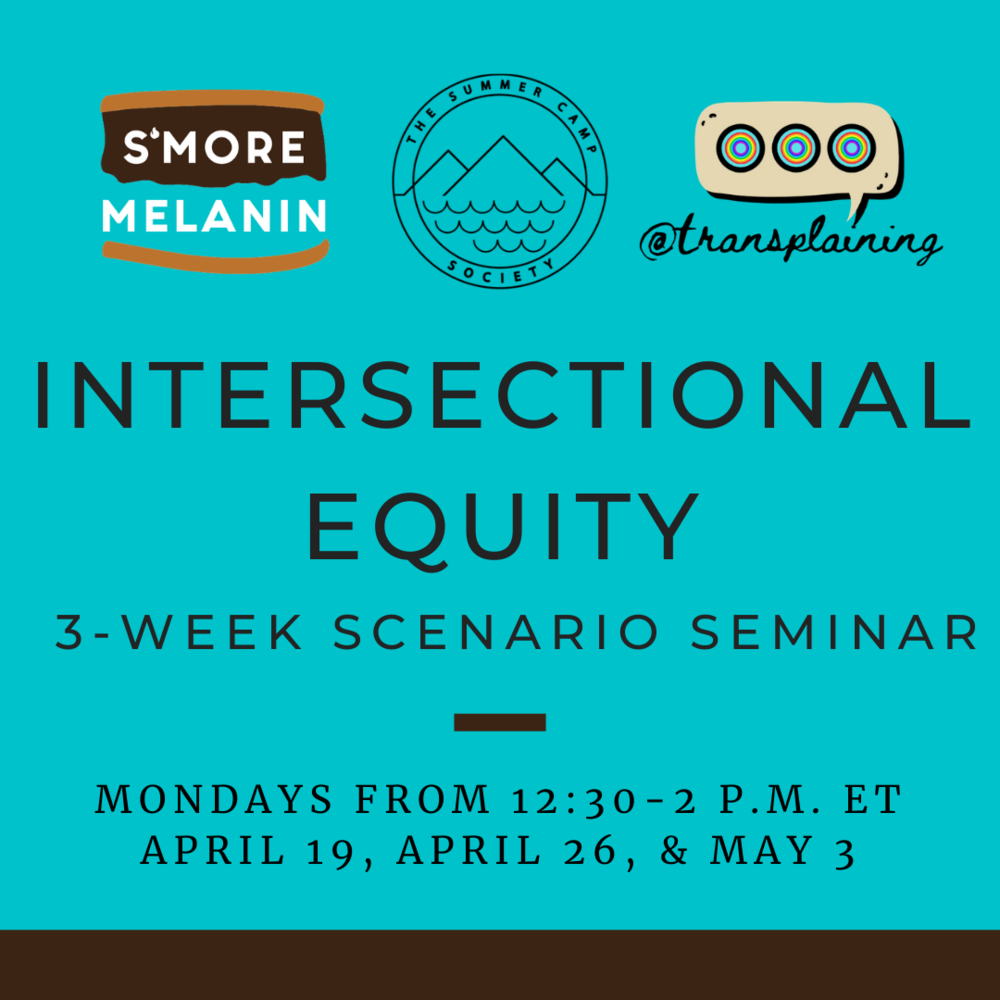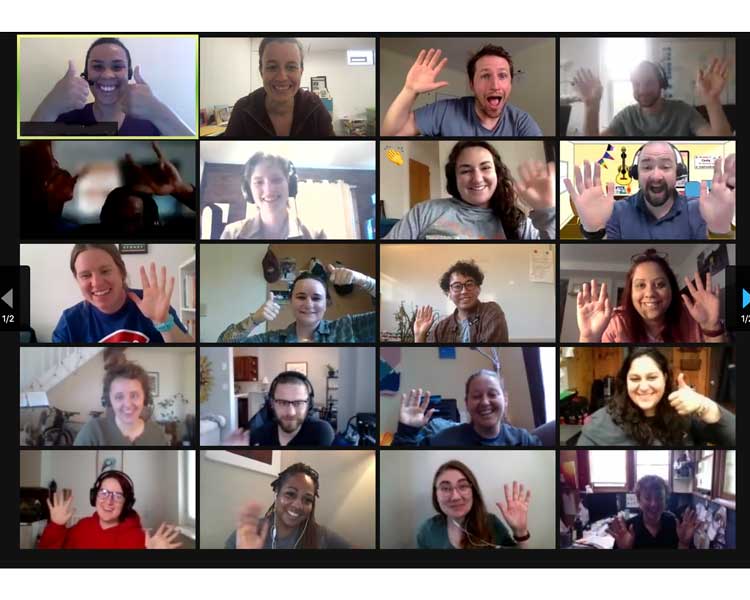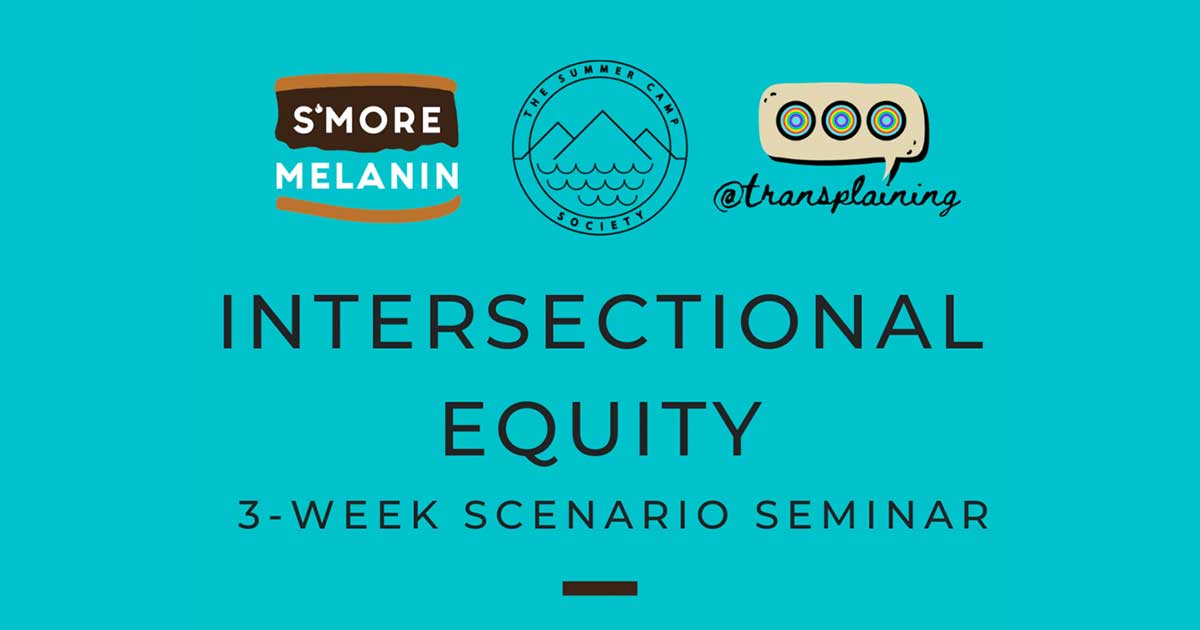As a Client Success Manager at CampMinder, I spend my days supporting camps across the country in their work to facilitate meaningful summer experiences. It is through this role that I was given the opportunity to attend the Intersectional Equity Scenario Seminar hosted by S’more Melanin, Transplaining, and The Summer Camp Society.
My own experiences at camp as a white, cisgender woman highlight how important this type of seminar is. I spent a few years as a teenager at a co-ed residential camp in Maryland, which was a microcosm of my world back home. The same kids were popular, the same social rules applied, and my seventeen-year-old counselors hardly knew how to sort out disputes among my white and affluent cabin. They were certainly not prepared to handle any equity scenarios. Later, I worked as a counselor at a girls wilderness camp in Northern Michigan. The campers were wild, hilarious, opinionated, and boisterous, but there were no BIPOC counselors or administrative staff. We weren’t trained to handle equity scenarios that affected our few BIPOC campers.

The three facilitators of Intersectional Equity Scenario Seminar were Briana Mitchell and Makela Elvy of S’more Melanin, and Chris Rehs-Dupin of Transplaining. S’more Melanin works with camps to help them create just and equitable camp experiences for BIPOC individuals. Transplaining is an organization that works to create a safe(r) world for transgender and gender non-conforming youth and adults.
The seminar was guided by Kimberlé Crenshaw’s concept of Intersectionality, which is a framework to understand how elements of our identity—like race, gender, or class—intersect with one other and affect our experience in society. The identity-related scenarios that were presented felt deeply relevant to me because of my time at camp and my current position at CampMinder. They reinforced that I can’t try to approach conflict without thinking about, and confronting, my privilege and power. Within the theme of intersectionality, the three sub-topics that resonated with me the most are:
- How to apply the practice of trauma-informed care
- How to properly approach equity scenarios and recognize bias
- How to accept feedback
My other takeaway is that learning from the experts at the organizations who facilitated the seminar is a great place to begin if you’re interested in these topics—follow them on social media (here, here, and here) and check out their online resources.
Trauma-informed care is broadly valuable and essential
I had heard the term trauma-informed care before attending the Intersectional Equity Scenario Seminar, and I had learned the basics of the approach. I understood it to mean getting a full picture of an individual’s life and situation and basing your care for them on this information.
Still, I wasn’t sure if there were qualifications needed to practice trauma-informed care or if it was applicable beyond a clinical setting. Chris Rehs-Dupin of Transplaining cleared this up right away, and explained that you don’t need to be a psychologist to employ this approach. At its core, trauma-informed care is a practice that assumes participants are more likely to have experienced trauma than not.

Chris went deeper and explained that trauma is any experience that limits or disrupts a person’s access, or perceived access, to safety and well-being. I tend to think of trauma in the context of a single life-threatening event—this expanded my understanding and helped me to see how widespread traumatic experiences can be.
Practicing trauma-informed care requires us to reframe challenging emotional situations, whether that’s with campers, colleagues, or relatives. We discussed an example where a child refuses to participate in a letter-writing activity and instead acts out, speaking negatively about the activity and distracting other campers. Trauma-informed care asks us to take a step back and wonder why this child might feel unsafe at this moment. Thinking of myself as a counselor, I thought about how I would have framed the activity. Would I describe the task as writing to a loved one or to “Mom & Dad?” If a child has a family situation that is different from what I described, framing it differently would make it a more inclusive activity, and affirm this child’s experience.
I learned that anxiety, fear, anger, sleep and appetite disturbances, and argumentative behavior can all be reactions to trauma. Trauma-informed care asks us to set aside our frustration when someone we’re working with isn’t listening or is acting out, and respond with empathy instead. This is what I found most profound about this topic during the Intersectional Equity Scenario Seminar.
At camp, kids are at a heightened state of vulnerability, and sometimes have less support than they do at home. Campers are trying new things and taking risks, which can lead to trauma responses. Of course, adults experience vulnerability, change, and transition too. Trauma-informed care in our relationships can help us create supportive and fulfilling communities and support systems.
At camp, kids are at a heightened state of vulnerability, and sometimes have less support than they do at home. Campers are trying new things and taking risks, which can lead to trauma responses. Of course, adults experience vulnerability, change, and transition too. Trauma-informed care in our relationships can help us create supportive and fulfilling communities and support systems.
Put frameworks and policies in place to successfully create safer environments
 One of the simplest and most impactful lessons Briana and Makela of S’more Melanin shared for me during the Intersectional Equity Scenario Seminar was that camp leaders, or people who have jurisdiction over handling these scenarios (counselors, admin, HR, etc.), shouldn’t rely on gut decisions in equity scenarios. Bias is ingrained in all of us, and our biases are most likely to show up in our gut reactions. We can put policies in place to help us make intentional decisions and combat our biases.
One of the simplest and most impactful lessons Briana and Makela of S’more Melanin shared for me during the Intersectional Equity Scenario Seminar was that camp leaders, or people who have jurisdiction over handling these scenarios (counselors, admin, HR, etc.), shouldn’t rely on gut decisions in equity scenarios. Bias is ingrained in all of us, and our biases are most likely to show up in our gut reactions. We can put policies in place to help us make intentional decisions and combat our biases.
Briana, Chris, and Makela shared a seven question approach to help navigate scenarios with an equity lens.
- Whose voices are centered?
- Who is missing?
- Who will this affirm?
- Who will this silence?
- Who will this make feel like an outsider?
- Who needs to know about this?
- How do you follow up on this?
Briana, the director at Achievement First Camp, shared that when she encounters a complex equity scenario at camp, she initially asks for five minutes away from the group to make sure she’s addressing the situation intentionally. She takes a couple of minutes to write out her plan and a minute or two to reflect on the questions above and adjust her plan before executing. This was radical to me. At camp, I often felt that I needed to know what to do in the moment to demonstrate my skill as a counselor. I didn’t realize that this rush to action may have led to less equitable outcomes for my campers.
What became evident for me is that there have to be structural policies in place, like a commitment to this framework, that are supported at all levels of the organization. It feels good and worthwhile to cultivate situational awareness for individuals, such as training staff in addressing equity scenarios, but structural support is needed when individuals make mistakes. Maybe a cabin counselor encounters a situation that is beyond the scope of their training. The question to ask is if that counselor has the resources to ask for help in order to make a more equitable decision.
For any organization, one action step the presenters emphasized is to ask the question of how best to follow up meaningfully with structural change. Are there policies that could be put in place that would have prevented this issue? How can we amend our policies to align with our commitment to equity, as evidenced in this scenario?
Look at feedback favorably and as an opportunity for growth and positive change
We began each of our sessions with the ground rule that “correction is an act of love.” The meaning behind this is that a person correcting us or offering feedback is vulnerable in doing so, and is expressing trust and care that we will react appropriately in response.
One experience we discussed is that often leaders claim to be open to feedback, especially in DEI initiatives or equity scenarios, but become defensive and resistant when staff approach them to offer that feedback. The commitment to creating a more equitable environment, relies on being open to correction or feedback, even if it is hard to hear. Another aspect of this approach is to consider that the absence of feedback isn’t necessarily an indicator that things are alright—we may be creating an environment where people aren’t comfortable giving it.
For me as a counselor, receiving critical feedback felt very uncomfortable. We didn’t have a structure in place for consistent feedback or a process for following up and ensuring meaningful change. Because of this, critical feedback felt embarrassing and personal. I felt that asking for additional support from busy direct supervisors would burden them further.
Hearing our seminar facilitators affirm that correction is an act of love at the beginning of each session helped me imagine how much safer our work environment could have been if we had normalized feedback and mistake-making.
Turning the knowledge from the Intersectional Equity Scenario Seminar into practice

Participating in this seminar allowed me to reflect on my experience as a camper and counselor. In both instances, the approach was to act as though the both predominantly-white camps did not face equity issues. We operated from a misguided belief that an organization’s values can prevent these issues from arising. This was exacerbated by the way that camp is often portrayed as completely separate from the rest of the world. Of course this isn’t the case with those camps, and it’s not true of any other environment. I was reminded that we bring our biases wherever we go, and the practices I learned about that can help create more equitable camp environments are applicable in all organizations as well.
If you’re interested in learning more, check out the resources from S’more Melanin, Transplaining, and The Summer Camp Society.
